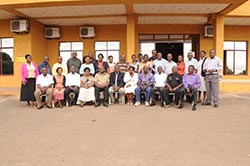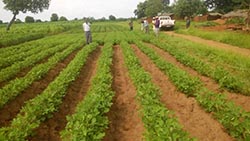N2Africa in Malawi started its work in 2010 and has been operating in seven administrative districts of Lilongwe, Dedza, Ntcheu, Salima, Dowa, Kasungu, Mchinji. It worked with partners such as (i) Government’s Department of Agricultural Extension Services- District Agriculture Development Offices (DAES-DADOs) on technology dissemination (ii) World Vision (WV) on technology dissemination (iii) Catholic Relief Services (CRS) on technology dissemination (iv) National Smallholder Farmers association of Malawi (NASFAM) on technology dissemination and marketing (v) Agro-Input Suppliers Limited (AISL) on input supply and marketing (vi) Interchurch Organization for Development Cooperation/Churches Action in Relief and Development (ICCO/CARD) on technology dissemination, community seed production and output marketing.

|

|
So far over 30,000 farmers in Malawi have been reached with various legume technologies through demonstrations, field days, agriculture fairs, and training. Technologies being disseminated include use of inoculants (Nitrofix), the use of improved legume varieties, and the use of improved agronomic practices.
Since N2Africa will be phasing out in Malawi at the end of 2017, main partners that will continue disseminating activities are District Agriculture Development Offices (DADOs under DAES) of Dedza, Ntcheu, Salima, Dowa, Kasungu,and Mchinji. AISL stands out as the main player on input supply and marketing, and cooperatives formed under ICCO/CARD are geared to continue engaging in community seed multiplication and collective output marketing.
Technology dissemination
Smallholder farmers under DAES-DADO will be the driving forces at grass-root level in the continuation of dissemination of technologies under the guidance of lead farmers and supervision of AEDCs/AEDOs. At a review and planning meeting held in November 2017 in Lilongwe, officers from these DADOs lined up activities such as mounting of demonstrations by lead farmers, conducting field days and facilitating exchange visits as some of the major highlights in the 2017/2018 season.
Achieving sustainable input supply
Through N2Africa’s work in Malawi, a lot of awareness about the benefits of rhizobium and the use of inoculant was created among the farming community. However, the challenge was limited access to inoculants because of the small production capacity at DARS. N2Africa therefore lobbied for the private sector and agro-dealers as partners, to map a way to achieve a sustainable input supply. Partnership was therefore established between N2Africa and Agro-Input Suppliers Limited (AISL), a private sector firm, which took up the challenge to scale up the production of inoculant. N2Africa trained two technicians from AISL at the IITA Ibadan labs and the inoculants have been widely tested and proved to be effective in increasing soyabean yields in Malawi. In the previous 2016/2017 season, AISL sold more than 200,000 sachets of rhizobium inoculant in Malawi. It is expected that production in the current 2017/2018 will exceed 500,000 sachets of inoculant branded as Nitrofix reaching over 10000 farmers and covering over 7,000 hectares of land.
Community seed production and collective output marketing
Through the four cooperatives established under ICCO/CARD’s watch and having built capacity of the cooperatives members, there are high chances of continuity of their activities in areas of soyabean production and collective output marketing. Farmers belonging to the seed production association intend to add value to their seed through packaging and branding. CARD aims to ensure that the cooperatives continue their activities by linking them to big agro-dealer companies such as Farmers World, Sunseed Oil Company and others.
The N2Africa Project Malawi Exit Strategy report is available here.
Lloyd Phiphira, Country Coordinator Malawi
